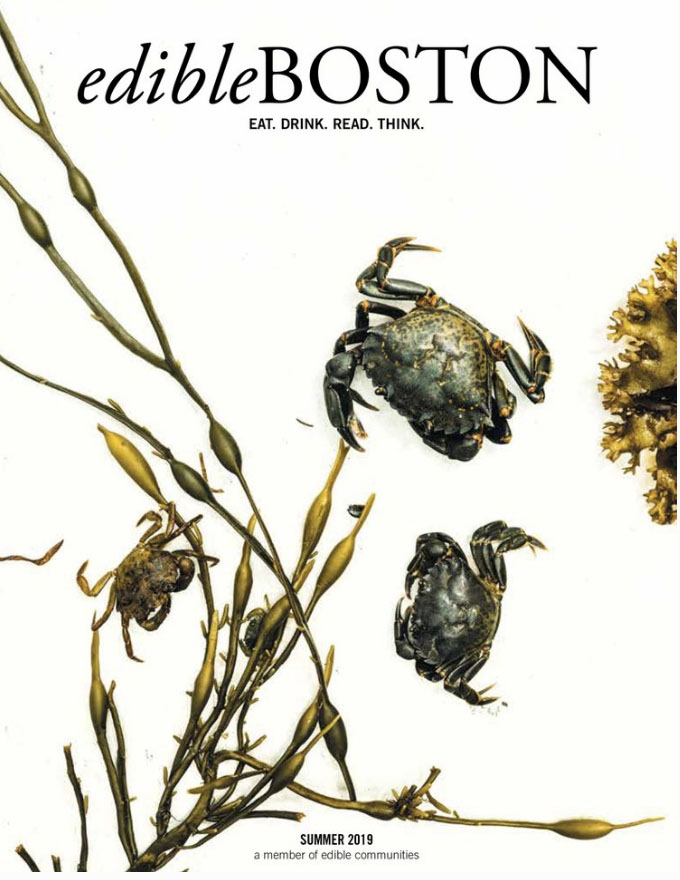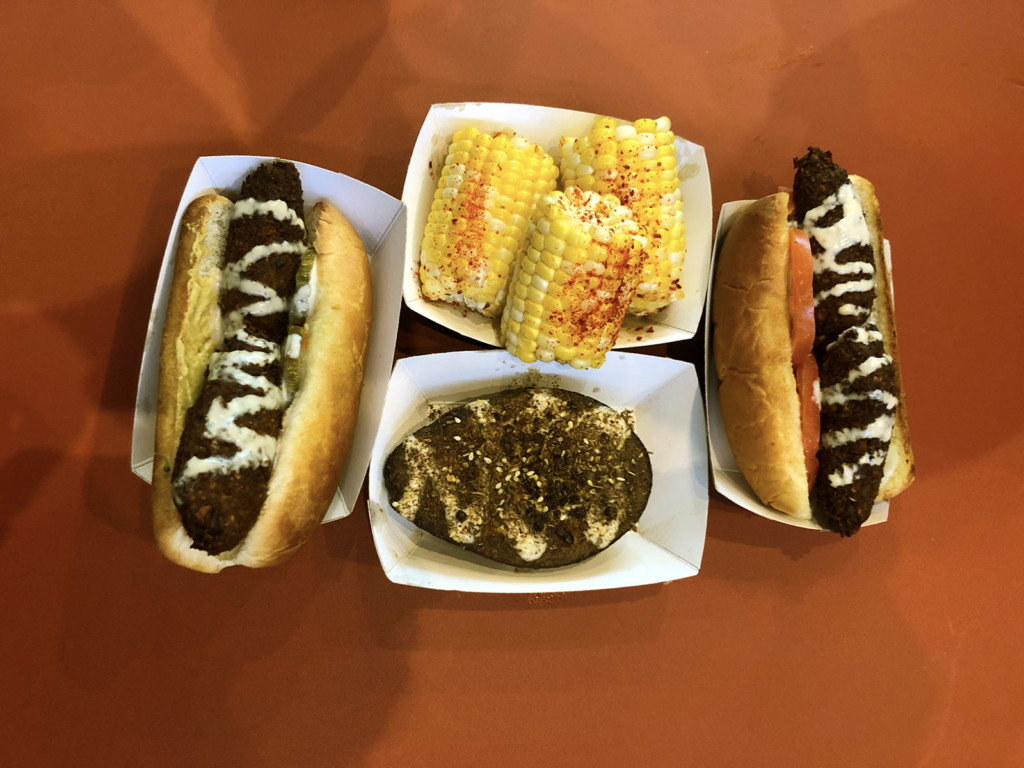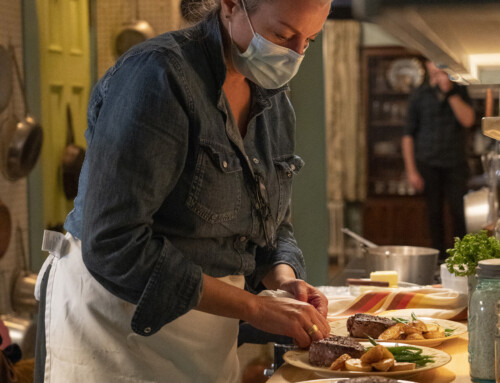By Nina Livingstone
This year’s cold, wet spring hadn’t yet loosened its grip on New England. Yet when I entered Whole Heart Provisions, a natural warmth emanated not just from its bright decor but from the owner herself. Rebecca Arnold’s energy and enthusiasm filled the spacious restaurant in Cambridge’s Central Square. It was in the kitchen that Arnold pointed out the volume it could produce: 100 cups of rice from her cookers, 280 heads of cauliflower pickling over the course of a week; 200 pounds of chickpeas (her Allston location gets credit for the chickpeas, which when fried produce an unforgettable crunch). Unlike the traditional clogs seen on the feet of most chefs, Arnold is known for her gym sneakers, perhaps because she is constantly on the move.
EDIBLE BOSTON: In 2015, you and co-founder James DiSabatino opened your first Whole Heart Provisions in Allston; three years later, you opened two more in Cambridge (Central Square spring 2018; Harvard Square fall 2018). How has your life changed running not one but three restaurants?
REBECCA ARNOLD: I’m usually a “do-it-myself” type of person, and I’ve definitely had to learn to rely on my team more now that I can’t be everywhere all of the time, although I certainly wish I could.
What do you think is driving this growth in the plant-based restaurant business?
I think that people are definitely coming around to the idea that not every meal needs to revolve around meat. As a society we’ve evolved into becoming more conscious of the environmental impact a meat-forward diet has. I think we also are more conscious of our health. As a restaurant group, we wanted to provide meals that fit into that lifestyle—“healthy, environmentally conscious, cost effective.” As a chef, what’s most important to me is the flavor of our food because I believe that our guests value flavor as much as, if not more than, all of the other expectations.
Are you a vegetarian or vegan?
I eat everything, but try to maintain a pretty healthy and balanced diet without restricting myself or saying “I can’t have ___.” I have a background in the nutrition field and was always looking for ways to get more veggies into my diet.
What are your thoughts on meat grown in a lab?
So far, I am intrigued but a bit skeptical of “lab grown” meat. I think it could play a huge role in helping reduce our animal-meat consumption. Clearly, people want to eat meat, and I think that lab grown is a way to provide the taste and feeling that you are eating meat without the harmful effects on our planet. However, I do not know enough about how healthy it is for us to consume. … That being said, I have tried a few versions and am definitely impressed with the product coming out of some of these labs. I think [Whole Heart Provisions] will still showcase vegetable and grains, and incorporating more local and seasonal items into our menu, before adding lab grown [meat] just yet.
What was your food-based upbringing like?
I grew up in Easton, Massachusetts: suburbia. My parents both cooked a lot, but were not plant-based by any means. I started taking an interest in nutrition at an early age while practicing and teaching karate, and dreamed of opening a healthy fast-food restaurant. This led me on my path to study nutrition and I attended The Natural Gourmet Institute in NYC.
What was the first dish you remember making?
I think the first dish I really wanted to learn to make was my mom’s chicken soup. It’s one thing I always have in my freezer and can’t live without.
How about your favorite dish off the Whole Heart menu?
My favorite dishes are the Cassie (inspired by and named after Cassie Piuma, the chef owner of Sarma), the seared avocado and the falafel dog.
Your culinary journey has taken you from Alden & Harlow to Sarma. Was this a natural progression?
I think I naturally gravitated towards chefs who featured vegetables, since I see them as such an interesting and integral part of the meal.
What was your takeaway from these other restaurant experiences?
I really learned to play with textures, sauces, acid and heat and utilize ingredients in untraditional ways. Why not make a lentil crispy rather than soft? What can you sweeten a sauce with besides just sugar or agave? We use apricot jam in our harissa dressing.
When you started Whole Heart Provisions in 2015, how many vegetarian restaurants were around? Are you feeling the heat from competitors now that it’s growing?
There were definitely a few other vegetarian restaurants, but vegan sections on menus were certainly not as comprehensive as they are today. I’d love to see some of the veggie-based players in Boston become national heavy hitters—along with ourselves.
Even in the Greater Boston area more and more restaurants are marketing themselves as vegan and vegetarian when that’s only a portion of their menu. Do you think they are trying to ride the plant-based wave? Is this good or bad?
I think it’s great! I love seeing more plant-based options at non-vegetarian restaurants. Both for meat eaters and vegetarians alike. I think the days of a vegetarian only having one boring pasta with veggies in it to choose from are long gone (thank goodness!).
What about restaurants using the term “plant-based” (as opposed to vegan). I am assuming it’s to cater to a wider range of clientele. How do you feel about that?
The word “vegan” has had a bad rep as being bland hippie food. It provoked thoughts of hummus, sprouts, raw carrots, sunflower seeds and Boca Burgers. It’s definitely starting to make a comeback and become more mainstream, but I think restaurants have been using “plant-based” to sound more appealing to all.
Any idea what sector of the population you serve—old, young, vegan, non-vegetarians?
About 83–85% of our diners do not identify as vegan or vegetarian. Our largest demographic is 18- to 36-year-olds, but a lot of those numbers are evolving since we opened our third restaurant on Harvard’s campus. It will be interesting to see how these numbers continue to evolve as we expand.
What or who inspired some of your more unusual dishes, like your Viet Signature Bowl with its roasted broccoli and smashed cucumber… among other ingredients… and what about your seared avocado and the famous falafel dog?
I’ve taken inspiration for the menu from all over. I staged at places like Mission Chinese, Slanted Door, Incanto, Toro and more. Travel has definitely inspired a lot of the menu. I first learned that avocado could be cooked while working at Alden & Harlow, where we torched slices of it to char the outside. The Israeli spices were inspired by a previous trip to Israel where we dipped all our bread in za’atar, and brought jars of it home. It’s such a lovely acidic spice mixture, I thought it would complement the richness of the avocado really well. And of course, fried lentils to top it off for some crunch!
Can you explain what Street Food Snacks are? (Crispy Brussels, Street Corn, Sesame Shishitos)?
Street Food Snacks are meant to be fun and interesting little side dishes. They could be shared amongst a group; they’re often eaten with your hands; they’re bold-flavored, bright and exciting and we are working on bringing more exciting, seasonally based Street Food Snacks to the menu soon.
Can you describe a typical day from dawn to nightfall?
Right now, I’ve been starting my day off in Allston, where catering for Whole Heart is produced. I spend a significant time working on menu development, while training staff. There’s always the last-minute fire to put out as in any early restaurant group, as well as strategy meetings to attend. Most are focused on improving our employees’ lives and operations. I catch a yoga class or a gym session to help me maintain balance in my life. Late night I can be found dining out with friends as there’s always a great new restaurant to try or favorite to return to.
What are five ingredients that you need to make a meal?
I’m a huge soup fan; I always have homemade stock in my freezer. I typically build meals around dark greens, a grain or crusty bread, garlic or onions, local eggs and a hunk of Parmigiano Reggiano.
This interview has been condensed for length and appeared in the Summer 2019 issue of Edible Boston Magazine.
Nina Livingstone is a Boston-based writer who, after losing her sight and most of her hearing, has learned to rely on her sense of smell, taste and touch when writing about food and the people who create it. Her only true addiction is tomatoes and finds a reason to have one every day. You can see other examples of her work at destinationmirth.com. She can be reached at nina@ninalivingstone.com.









